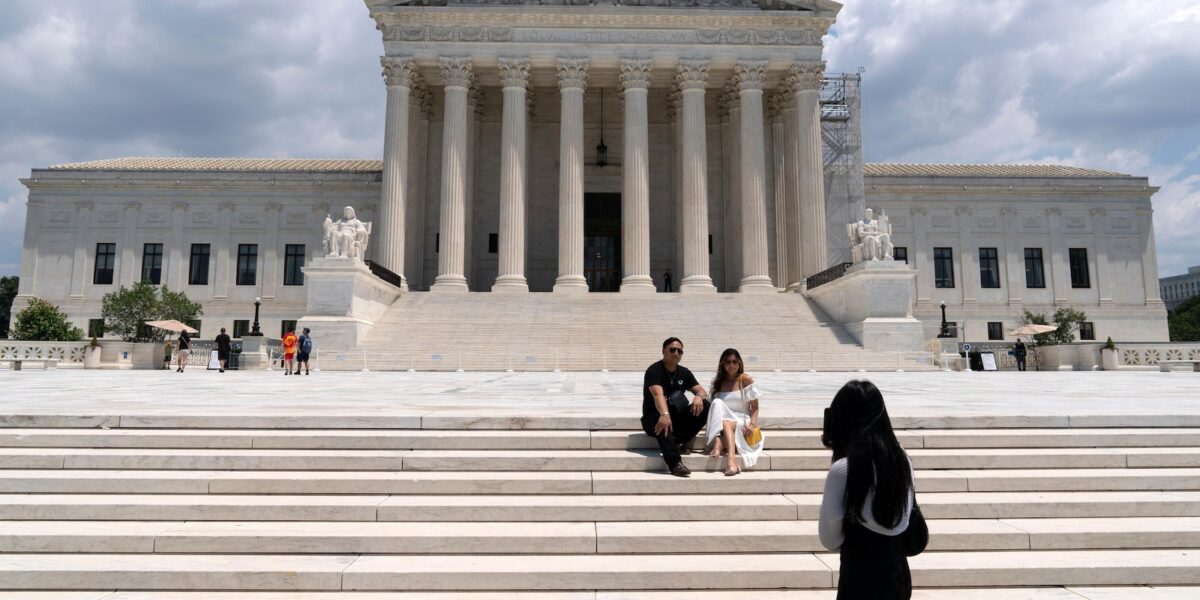WASHINGTON — WASHINGTON (AP) —
The Supreme Court on Friday upended a 40-year-old decision that made it easier for the federal government to regulate the environment, public health, workplace safety and consumer protections, delivering a far-reaching and potentially lucrative victory to business interests.
The court’s six conservative justices overturned the 1984 decision colloquially known as Chevron, long a target of conservatives. The liberal justices were in dissent.
Billions of dollars are potentially at stake in challenges that could be spawned by the high court’s ruling. The Biden administration’s top Supreme Court lawyer had warned such a move would be an “unwarranted shock to the legal system.”
The heart of the Chevron decision says federal agencies should be allowed to fill in the details when laws aren’t crystal clear. Opponents of the decision argued that it gave power that should be wielded by judges to experts who work for the government.
“Courts must exercise their independent judgment in deciding whether an agency has acted within its statutory authority,” Chief Justice John Roberts wrote for the court.
Roberts wrote that the decision does not call into question prior cases that relied on the Chevron decision.
But in dissent, Justice Elena Kagan wrote that the assurance rings hollow. “The majority is sanguine; I am not so much,” she wrote.
The court ruled in cases brought by Atlantic herring fishermen in New Jersey and Rhode Island who challenged a fee requirement. Lower courts used the Chevron decision to uphold a 2020 National Marine Fisheries Service rule that herring fishermen pay for government-mandated observers who track their fish intake.
Conservative and business interests strongly backed the fishermen’s appeals, betting that a court that was remade during Republican Donald Trump’s presidency would strike another blow at the regulatory state.
The court’s conservative majority has previously reined in environmental regulations and stopped the Democratic Biden administration’s initiatives on COVID-19 vaccines and student loan forgiveness.
The justices hadn’t invoked Chevron since 2016, but lower courts had continued to do so.
Forty years ago, the Supreme Court ruled 6-0, with three justices recused, that judges should play a limited, deferential role when evaluating the actions of agency experts in a case brought by environmental groups to challenge a Reagan administration effort to ease regulation of power plants and factories.
“Judges are not experts in the field, and are not part of either political branch of government,” Justice John Paul Stevens wrote in 1984, explaining why they should play a limited role.
But the current high court, with a 6-3 conservative majority, has been increasingly skeptical of the powers of federal agencies. Justices Samuel Alito, Neil Gorsuch, Brett Kavanaugh and Clarence Thomas all had questioned the Chevron decision.
Opponents of the Chevron doctrine argue that judges apply it too often to rubber-stamp decisions made by government bureaucrats. Judges must exercise their own authority and judgment to say what the law is, they argued to the Supreme Court.
Defending the rulings that upheld the fees, President Joe Biden’s administration said that overturning the Chevron decision would produce a “convulsive shock” to the legal system.
Environmental, health advocacy groups, civil rights organizations, organized labor and Democrats on the national and state level had urged the court to leave the Chevron decision in place.
Gun, e-cigarette, farm, timber and home-building groups were among the business groups supporting the fishermen. Conservative interests that also intervened in recent high court cases limiting regulation of air and water pollution backed the fishermen as well.
The fisherman sued to contest the 2020 regulation that would have authorized a fee that could have topped $700 a day, though no one ever had to pay it.
In separate lawsuits in New Jersey and Rhode Island, the fishermen argued that Congress never gave federal regulators authority to require the fisherman to pay for monitors. They lost in the lower courts, which relied on the Chevron decision to sustain the regulation.
The justices heard two cases on the same issue because Justice Kentanji Brown Jackson was recused from the New Jersey case. She took part in it at an earlier stage when she was an appeals court judge. The full court participated in the case from Rhode Island.
___
Follow the AP’s coverage of the U.S. Supreme Court at https://apnews.com/hub/us-supreme-court.


